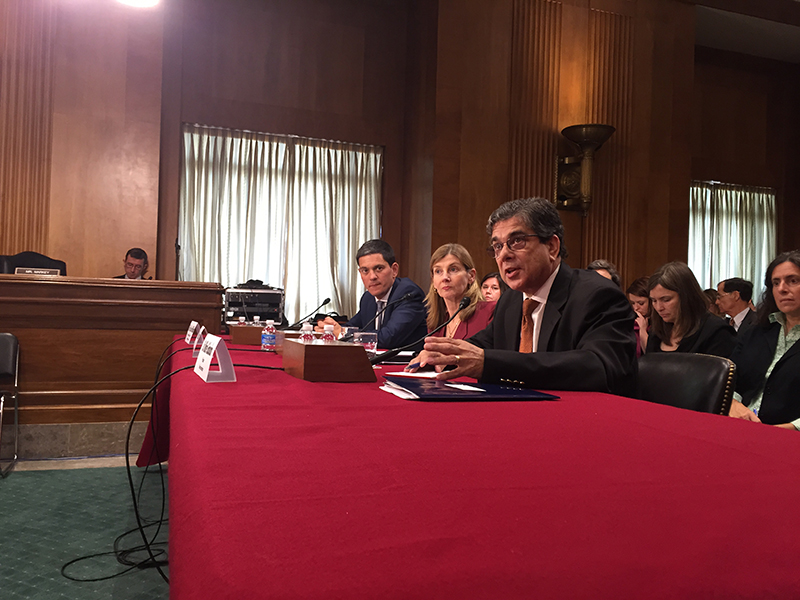
Humanitarian group leaders (right) Dr. Michel Gabaudan of Refugees International, Nancy Lindborg of United States Institute of Peace, and David Milliband of the International Rescue Commitee describe their experience working with refugees from the Middle East over the last few weeks. (Sara Shouhayib/MEDILL NSJI)
WASHINGTON – The United States should increase humanitarian aid to people in hard-to-reach and besieged areas of the Middle East and share more responsibility with Europe in admitting refugees, senators and witnesses said at a Foreign Relations hearing Tuesday.
The committee focused on a humanitarian crisis that many are calling, “the worst since WWII.” The emphasis was on Syria and more broadly on how to help refugees return to their battered lands when the fighting ends.
Testifying before the Senate committee, International Rescue CommitteePresident David Milligan said people are fleeing Syria because of barrel bombings attributed to the Assad regime as well as threats from the terrorist group, ISIS.
Sen. Robert Menendez, D-N.J., said he feared circumstances on the ground inSyria are “getting worse, not better. We’re doing nothing to stop the barrel bombing, including that of chlorine gas.”
Witness Nancy Lindborg, the president of the United States Institute of Peace,who has done extensive work in Iraq, said the focus should be on giving refugees a chance to return home. Education, employment and trauma counseling could help refugees rebuild their society, Lindborg said.
“Even if Europe and the U.S. take the most generous amount of refugees possible that will only scratch the surface,” she said. The average displacement for a refugee inside a strife-torn country is 17 years, Lindborg said.
According to the United Nations High Commissioner for Refugees, nearly 4 million Syrians have fled the country and 7.6 have been displaced since the conflict began five years ago.
Secretary of State John Kerry announced earlier this month that the Obama Administration would increase the acceptance of refugees to 100,000 by 2017. But that number could change with mounting pressure from the international community as European nations admit more people. The current annual cap of refugee admittance in the U.S. is at 70,000.
Sen. Edward Markey, D-Mass., said that it all comes down to politics.
“I think the breakthrough honestly has to be Obama and Putin sitting down and reaching an agreement on this,” he said. “I think not any other intervention is going to be effective on this in the long run. We need a political resolution on this.”
Alar Olljum, visiting Fellow in the center for U.S. and Europe at the Brookings Institution, also favors a political solution.
Humanitarian assistance, Olljum said, is only a temporary solution. “The only permanent solution is to have a political settlement to the conflict in that country.”
Senate Foreign Relations Committee Chairman Bob Corker, R-Tenn, said refugees are just like everyone else.
“The images of thousands of men women and children fleeing for safety should challenge every moral fiber within,” he said. “[They] want only to be able to raise their families in dignity and cherish the same values and things that we all care about, and yet we watch them on television in these desperate circumstances.”





